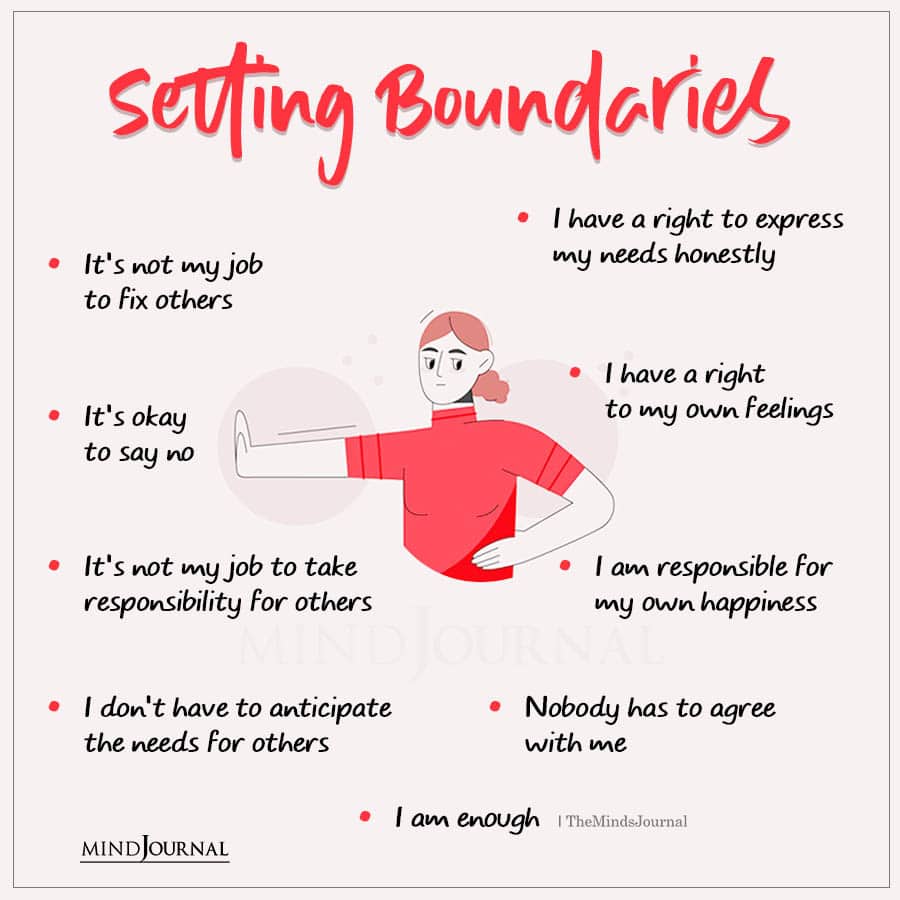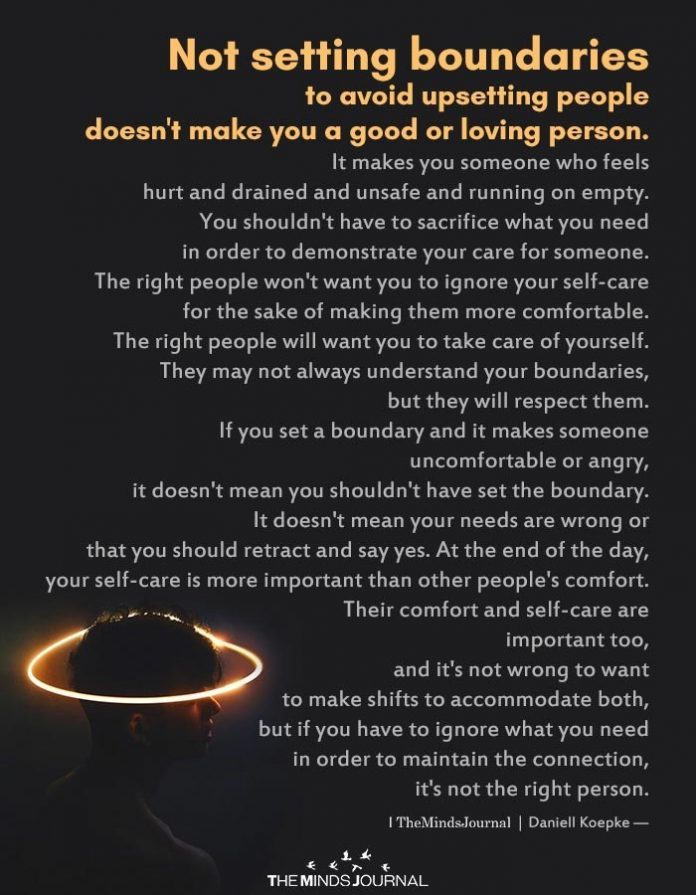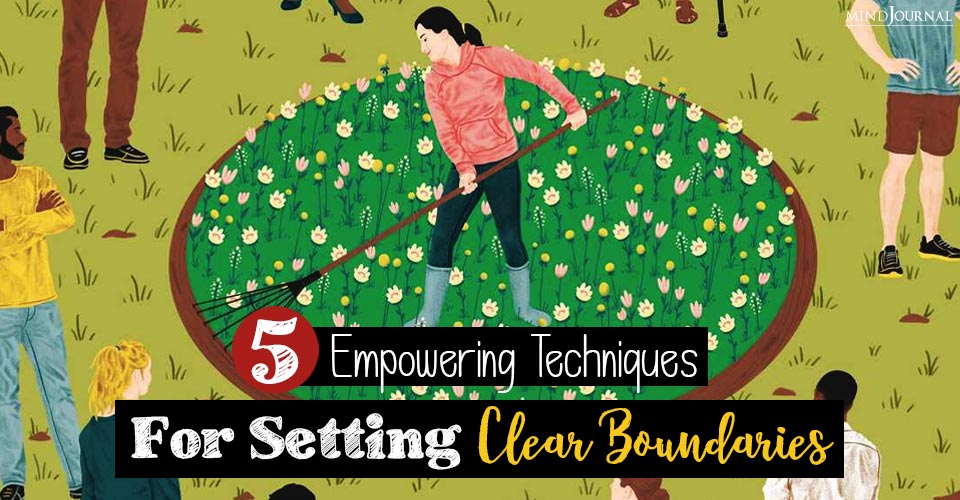“Setting boundaries is your responsibility. People will continue to do what you allow. You get to decide what is and what isn’t allowed in your life.” – Unknown
Key Points
- Maintaining boundaries and openly communicating and asserting your values help protect against their being compromised.
- Committing to mental/emotional health boundaries will decrease your anxiety, depression, and overall sense of being overwhelmed.
- Define the personal space bubble that feels most comfortable to you, and mindfully explain why you need more breathing room.
Maintaining boundaries is something people struggle with every day. Personal boundaries, or the act of setting boundaries, is a life skill that has been popularized by self-help authors and support groups since the mid-1980s.
The American Psychology Association dictionary defines the term ‘boundary’ as “a psychological demarcation that protects the integrity of an individual or group or that helps the person or group set realistic limits on participation in a relationship or activity.”
Throughout the pandemic, boundary setting became more complicated and challenging for people faced with balancing remote and hybrid models of employment to maintain their work/life equilibrium. However, besides keeping our work/life boundaries, people constantly set boundaries regarding our mental/emotional health, physical space, relationships, and materials.
Sometimes, since we’re unaware, we can set boundaries, but our messaging and preferences may be fluid or inconsistent. This leads to regular boundary violations from those around us. Here are five techniques that, if used correctly, will empower you to set clear boundaries in the five crucial areas I cited.
Related: Setting And Maintaining Boundaries: How To Set Boundaries To Protect Your Mental Health
5 Techniques That Can Help You In Setting Clear Boundaries
1. Mental/Emotional Health.
Setting mental/emotional health boundaries help decrease feelings of anxiety and depression. Holding on to your thoughts, feelings, beliefs, and opinions negates other people’s ability to invalidate or disparage them.
Curate what you choose to listen to, and don’t feel that your emotions must be in sync with everyone else’s. Strong boundaries will enable you to coexist with others while eliminating the need for forced conflict and/or judgment of each other’s state of mind. No one wins. No one loses. This increases self-confidence and self-respect.

2. Physical Space.
Define the personal space bubble that feels most comfortable to you. If people come too close to you, move back two or three steps. You can mindfully explain that you require a little more breathing room and that it’s not personal.
Physical touch can feel invasive and uncomfortable. It’s okay to advise people you prefer they don’t touch you and that you hope and trust they can respect your space.
Related: How To Set Clear Boundaries: 5 Steps To Better Emotional Boundaries
3. Work/Life Boundaries.
Set your work life boundaries, and then stick to them. Decide on a daily schedule, when you’ll log on and off your computer, and whether you’ll have work hours on the weekends.
Turn off work notifications on smartphones and laptops when you’re supposed to be ‘out of the office.’ If you’re owed a vacation, don’t forget to take it. If you violate your boundaries, others will too.
4. Relationships.
Setting boundaries in all areas of your relationships is essential. Be clear and transparent regarding your expectations of your partner’s time. For example, how often do you want to have date nights, what activities do you want to share, or how should you spend vacation time? Do you have a strategy for balancing family, intimacy, and solitary time?
If you give unclear messages about your boundaries, your partner is bound to push limits to see what your responses will be. The clearer you are, the less conflict and resentment will result.

5. Materials.
Owning property or a specific item does not automatically make it community property. Discuss and define which items are community property and which are not. In addition, set boundaries on items that you’re comfortable being used without permission and which items you’re not.
Be clear about your expectations when you’d like items returned. Avoid sending conflicting messages about your possessions. If your messaging is consistent, people respect your boundaries.
There are many positive aspects to setting more finite boundaries in your life. You will become a stronger person for it, as you experience an improvement in your confidence and self-respect.
Related: How Healthy Boundaries Help Protect Your Personal Space
There will be a concurrent reduction in scenarios where you feel overwhelmed, pressured, depressed, and anxiety-ridden because you have stopped allowing boundary violations. Over time, firm boundaries will assist you on a journey toward a more satisfying life.
Want to know more about how to set work life boundaries? Check this video out below!
The print version of Dr. Jennifer Guttman’s debut as an author, Beyond Happiness, The 6 Secrets Of Lifetime Satisfaction will be published by Post Hill Press on May 30, 2023. Pre-order link http://posthill.to/1637587945. You can also pre-order her book at Barnes & Noble – https://www.barnesandnoble.com/w/beyond-happiness-jennifer-guttman-psyd/1142978001
References:
APA Dictionary of Psychology, 2022, dictionary.apa.org, American Psychological Association
Written By Jennifer Guttman Psy.D. Originally Appeared On Psychology Today










Leave a Reply